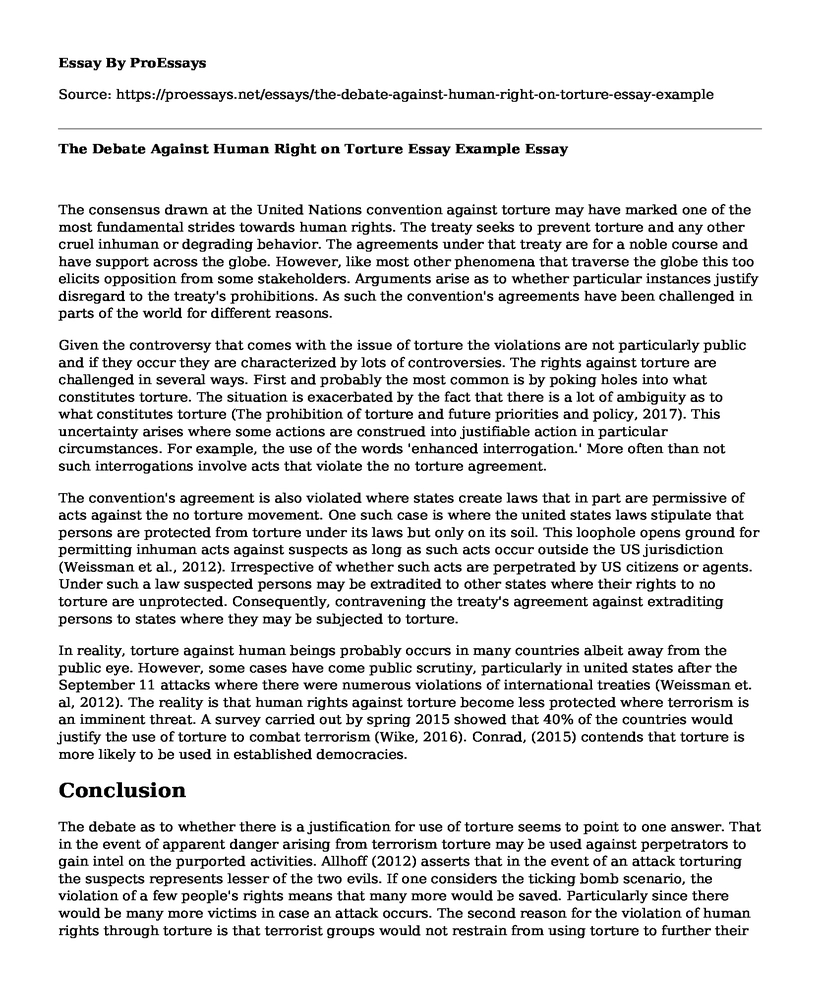The consensus drawn at the United Nations convention against torture may have marked one of the most fundamental strides towards human rights. The treaty seeks to prevent torture and any other cruel inhuman or degrading behavior. The agreements under that treaty are for a noble course and have support across the globe. However, like most other phenomena that traverse the globe this too elicits opposition from some stakeholders. Arguments arise as to whether particular instances justify disregard to the treaty's prohibitions. As such the convention's agreements have been challenged in parts of the world for different reasons.
Given the controversy that comes with the issue of torture the violations are not particularly public and if they occur they are characterized by lots of controversies. The rights against torture are challenged in several ways. First and probably the most common is by poking holes into what constitutes torture. The situation is exacerbated by the fact that there is a lot of ambiguity as to what constitutes torture (The prohibition of torture and future priorities and policy, 2017). This uncertainty arises where some actions are construed into justifiable action in particular circumstances. For example, the use of the words 'enhanced interrogation.' More often than not such interrogations involve acts that violate the no torture agreement.
The convention's agreement is also violated where states create laws that in part are permissive of acts against the no torture movement. One such case is where the united states laws stipulate that persons are protected from torture under its laws but only on its soil. This loophole opens ground for permitting inhuman acts against suspects as long as such acts occur outside the US jurisdiction (Weissman et al., 2012). Irrespective of whether such acts are perpetrated by US citizens or agents. Under such a law suspected persons may be extradited to other states where their rights to no torture are unprotected. Consequently, contravening the treaty's agreement against extraditing persons to states where they may be subjected to torture.
In reality, torture against human beings probably occurs in many countries albeit away from the public eye. However, some cases have come public scrutiny, particularly in united states after the September 11 attacks where there were numerous violations of international treaties (Weissman et. al, 2012). The reality is that human rights against torture become less protected where terrorism is an imminent threat. A survey carried out by spring 2015 showed that 40% of the countries would justify the use of torture to combat terrorism (Wike, 2016). Conrad, (2015) contends that torture is more likely to be used in established democracies.
Conclusion
The debate as to whether there is a justification for use of torture seems to point to one answer. That in the event of apparent danger arising from terrorism torture may be used against perpetrators to gain intel on the purported activities. Allhoff (2012) asserts that in the event of an attack torturing the suspects represents lesser of the two evils. If one considers the ticking bomb scenario, the violation of a few people's rights means that many more would be saved. Particularly since there would be many more victims in case an attack occurs. The second reason for the violation of human rights through torture is that terrorist groups would not restrain from using torture to further their activities. As such, some people argue that it only makes sense for a country to use torture against terrorist suspects if only for the good of the majority.
References
Allhoff, F. (2012). Terrorism, ticking time-bombs, and torture: A philosophical analysis. University of Chicago Press.
Conrad, C. (2015). When do countries respond to terrorism with torture? Retrieved from https://www.washingtonpost.com/news/monkey-cage/wp/2015/01/13/understanding-when-states-rarely-respond-to-terrorism-with-torture/?noredirect=on&utm_term=.d7edb2016378
The Prohibition of Torture: Future Priorities for Research, Policy and Practice. (2017). Retrieved from https://www.ucl.ac.uk/global-governance/sites/global-governance/files/The_Prohibition_of_Torture_Furture_Priorities_for_Research__Policy_and_Practice.pdf
Weissman, D. M. (2012). The North Carolina connection to extraordinary rendition and torture. University of North Carolina School of Law, January. Available from: www. law. unc. edu/documents/clinicalprograms/finalreditionreportweb. pdf (Accessed January 31, 2019).
Wike, R. (2016). Global opinion varies widely on use of torture against suspected terrorists. Retrieved from https://www.google.com/amp/www.pewresearch.org/fact-tank/2016/02/09/global-opinion-use-of-torture/%3famp=1
Cite this page
The Debate Against Human Right on Torture Essay Example. (2022, Nov 20). Retrieved from https://proessays.net/essays/the-debate-against-human-right-on-torture-essay-example
If you are the original author of this essay and no longer wish to have it published on the ProEssays website, please click below to request its removal:
- My Role as a Practitioner-Academic in Criminal Justice System
- Death Penalty Debate Essay
- Paper Example on Brown vs. Board of Education: Advancing Civil Rights in America
- Essay on Affordable Healthcare Act: Healthcare System Reforms & Overhauls
- Essay Example on Humans: Nature of Justice & Injustice Examined
- Research Paper on Crime: A Global Problem - Stopping it at Any Instance
- Paula v. Cash Mart & Geoffrey: Unlawful Detention & Possible Torts Claims - Case Study







